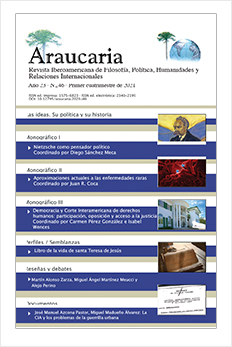Nietzsche y el posthumanismo
DOI:
https://doi.org/10.12795/araucaria.2021.i46.14Keywords:
Homo Natura, Posthumanism Naturalism NietzscheAbstract
In Beyond Good and Evil, Nietzsche envisages the naturalisation of the human being, its retranslation back into nature, as a liberating experience where the human being rediscovers nature as a creative and transformative force that the human being embodies. For Nietzsche, the question of the future of the human being is contingent on whether the human being is capable of re-embodying nature. Human nature for Nietzsche is not a given of the (human) body, something that belongs to the human being per se. Instead, nature in the human being comes with the task of retranslation, replanting, re-embodying nature. This is why Nietzsche’s thinking about nature is future oriented, opening up the horizon of human transformation. In this paper, I argue that Nietzsche’s thinking about homo natura is distinctly posthuman and as such sets the stage for contemporary debates on posthumanism.
Downloads
References
Agamben, Giorgio. Lo abierto. El hombre y el animal. Buenos Aires: Adriana Hidalgo, 2006.
Braidotti, Rosi. “Posthuman, All Too Human: Towards a New Process Ontology”, Theory, Culture and Society, 23(7-8) (2006): 197-208.
Braidotti, Rosi. “Posthumanist Critical Theory”, en Debashish Banerji y Makarand R. Paranjape (eds.), Critical Posthumanism and Planetary Futures, pp. 13-36. Nueva Dehli: Springer, 2016.
Braidotti, Rosi. Lo posthumano. Barcelona: Gedisa, 2015.
Deleuze, Gilles y Félix Guattari. Mil mesetas. Capitalismo y esquizofrenia. Valencia: Pre-Textos, 2002.
Esposito, Roberto. Bios. Biopolítica y filosofía. Buenos Aires: Amorrortu, 2006.
Foucault, Michel. Las palabras y las cosas. Méjico: Siglo XXI, 2007.
Haraway, Donna J. When Species Meet. Minneapolis y Londres: University of Minnesota Press, 2008.
Hayles, Katherine. How We Became Posthuman: Virtual Bodies in Cybernetics, Literature and Informatics. Chicago y Londres: University of Chicago Press, 1999.
Heidegger, Martin. Carta sobre el humanismo. Madrid: Alianza, 2006.
Kant, Immanuel. Lógica. Madrid: Akal, 2000.
Kirby, Vicky. Quantum Anthropologies: Life at Large. Durham y Londres: Duke University Press, 2011.
Lemm, Vanessa. La filosofía animal de Nietzsche. Cultura, política y animalidad del ser humano. Santiago de Chile: Ediciones UDP, 2010.
Lemm, Vanessa. “Is Nietzsche a Naturalist? Or How to Become a Responsible Plant”, Journal of Nietzsche Studies, 47(1) (2016): 61-80.
Lemm, Vanessa. “Deconstructing the human: Ludwig Binswanger on Homo Natura in Nietzsche and Freud”, en Daniel Conway (ed.), Nietzsche and The Antichrist: Religion, Politics, and Culture in Late Modernity. Londres y Nueva York: Bloomsbury, 2019.
MacKenzie, Adrian. Transductions: Bodies and Machines at Speed. Londres: Continuum, 2006.
Nietzsche, Friedrich. El anticristo: maldición sobre el cristianismo. Madrid: Alianza, 1997.
Nietzsche, Friedrich. La ciencia jovial. “La gaya scienza”. Caracas: Monte Ávila, 1999.
Nietzsche, Friedrich. Sobre la utilidad y los perjuicios de la historia para la vida. Madrid: Biblioteca Nueva, 1999.
Nietzsche, Friedrich. Más allá del bien y del mal. Madrid: Alianza, 2007.
Nietzsche, Friedrich. Sobre verdad y mentira en sentido extramoral y otros fragmentos de filosofía del conocimiento. Madrid: Tecnos, 2012.
Plessner, Helmuth. Die Stufen des Organischen und der Mensch. Einleitung in die philosophische Anthropologie. Frankfurt: Suhrkamp Verlag, 2003.
Sloterdijk, Peter. Normas para el parque humano. Una respuesta a la Carta sobre el humanismo de Heidegger. Madrid: Siruela, 2006.
Tuncel, Yunus, ed. Nietzsche and Transhumanism: Precursor or Enemy. Cambridge: Cambridge Scholars, 2017.
van Ingen, Michiel. “Beyond the Nature/Culture Divide? The Contradictions of Rosi Braidotti’s The Posthuman”, Journal of Critical Realism, 15(5) (2016): 530-542.
Wolfe, Cary. What is Posthumanism? Minneapolis: University of Minnesota Press, 2010.
Wolfe, Cary. Before the Law: Humans and Other Animals in a Biopolitical Frame. Chicago y Londres: University of Chicago Press, 2013.
Downloads
Published
How to Cite
Issue
Section
License
Las ediciones impresa y electrónica de esta Revista son editadas por el Secretariado de Publicaciones de la Universidad de Sevilla, siendo necesario citar la procedencia en cualquier reproducción parcial o total.Salvo indicación contraria, todos los contenidos de la edición electrónica se distribuyen bajo una licencia de uso y distribución “Creative Commons Atribución-NoComercial-SinDerivar 4.0 Internacional”








